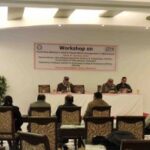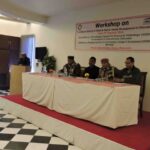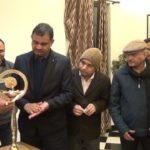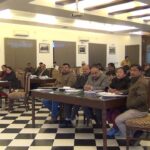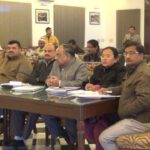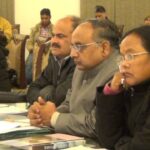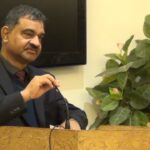EXPERIENCE SHARING WORKSHOP ON SOLID AND PLASTIC WASTE MANAGEMENT
EXPERIENCE SHARING WORKSHOP ON APPROPRIATE TECHNOLOGIES FOR SOLID & PLASTIC WASTE MANAGEMENT IN UTTARAKHAND
INTRODUCTION AND BACKGROUND OF THE PROJECT
The issue of poor waste management practices and plastic waste had become a growing concern in Uttarakhand state, which prompted the need for a comprehensive project to address the issue. In response to this challenge, a workshop on Solid Waste Management (SWM) and plastic waste management was organized on January 8th, 2016, with the objective of understanding the impact of such waste on the environment and the community as a whole. The workshop brought together various Urban Local Bodies (ULBs) who had initiated campaigns and programs to address waste management in their respective municipalities. The goal was to share experiences and best practices so that the conclusions of the workshop could be understood and replicated by other municipalities across the state.
One of the key objectives of the workshop was to address the misconceptions regarding the recycling of plastic bags. To achieve this goal, the facilitator of the Plastic Recycling Plant at Kathgodam was invited to share their expertise and knowledge with the participants. Through their presentation, participants gained a better understanding of how plastic bags are recycled into HDPE pipes, which helps to eliminate plastic waste from the waste stream once and for all. The workshop also aimed to cover the managerial aspect of the program, which was shared by a representative from the Indian Institute of Technology (IIT) Roorkee. This aspect of the program helped participants to understand the importance of effective waste management and the benefits of adopting a holistic approach. Overall, the workshop was a critical first step in addressing the challenges of waste management in Uttarakhand state. By bringing together stakeholders, sharing best practices, and addressing misconceptions, the workshop paved the way for a more comprehensive project to promote sustainable and effective waste management practices in the state’s ULBs.
AIMS AND OBJECTIVES OF THE PROJECT
1. Initiate a project with the central objective of replicating effective waste management practices observed in Urban Local Bodies (ULBs).
2. Employ a comprehensive approach to address the diverse challenges commonly encountered by Nagar Panchayats and Nagar Palikas.
3. Emphasize the primary focus of the workshop, which extends beyond plastic bags, encompassing a comprehensive strategy for waste management.
4. Empower Executive Officers of ULBs and other prominent stakeholders participating in the workshop to prioritize the implementation of composting and bio-gas generation within their waste management endeavours.
5. Acknowledge the significance of composting and bio-gas production as integral elements within the broader waste management framework.
6. Advocate for the adoption of a holistic waste management approach that promotes sustainable and environmentally responsible methods of waste disposal.
COMPONENTS AND ACTIVITIES OF THE PROJECT
1. Design a project with a range of components and activities geared toward facilitating the integration of effective waste management practices within Urban Local Bodies (ULBs).
2. Prioritize experience sharing as a pivotal element of the project, involving executive officers from various municipalities who have successfully implemented comprehensive Solid Waste Management (SWM) initiatives in their respective areas.
3. Showcase the operational model of Compactors in strategic locations like Joshimath, Chamoli, Gauchar, and Srinagar, providing valuable on-ground insights into plastic waste management practices.
4. Highlight the project’s strong emphasis on recycling, featuring a recycling plant in Kathgodam as a visual representation of the conversion of plastic bags into HDPE pipes, thereby permanently reducing such waste from the waste stream.
TARGET AREA OF THE PROJECT
The project’s scope covered all Urban Local Bodies (ULBs) within the state of Uttarakhand, with the objective of enhancing these ULBs through the promotion of efficient waste management practices, addressing the diverse challenges related to waste disposal.
TARGET GROUPS AND BENEFICIARIES OF THE PROJECT
The project’s intended beneficiaries included executive officers and associated staff of Urban Local Bodies (ULBs), as well as scientists, subject matter specialists, and relevant NGOs in Uttarakhand actively involved in waste management practices.
FUNDING PARTNER OF THE PROJECT
The funding partner for the project was the Uttarakhand State Council for Science & Technology (UCOST), Department of Science & Technology, Government of Uttarakhand, Dehradun.
SANCTIONED BUDGET OF THE PROJECT
The project was sanctioned by UCOST in 2015 through sanction order No. UCS&T/Workshop/15-16/10363, dated 04.12.2015. The order outlined the total budget sanctioned by UCOST for organizing the one-day workshop, which was set at Rs. 1,50,000.00.
OUTCOMES AND ACHIEVEMENTS OF THE PROJECT
The following outcomes and achievements have been accomplished after the successful implementation of the workshop:
1. Executive Officers have been educated about effective waste management practices, including composting and bio-gas generation.
2. The workshop has emphasized the importance of addressing waste in its entirety, not just plastic bags.
3. The workshop has promoted a holistic approach to waste management that facilitates sustainable and environmentally friendly waste disposal practices.
4. Successful SWM programs have been showcased, inspiring and educating executive officers to adopt similar practices in their respective regions.


